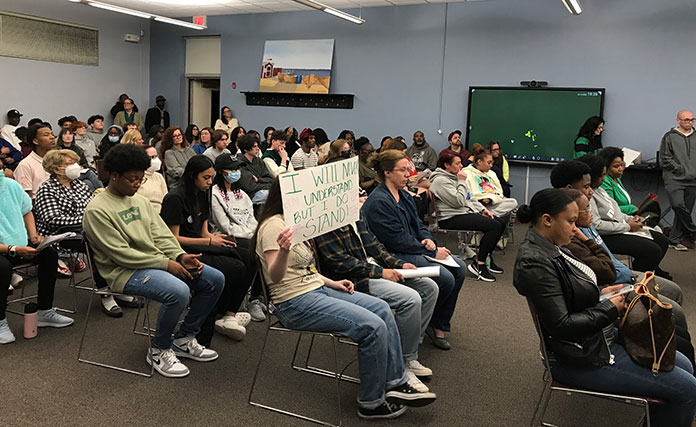
BERKELEY – When a board member’s social media postings were called racist by students and parents, district officials were told it was just a symptom of a larger problem in Central Regional High School.
The situation became public when one board member, Heather Koenig, posted memes on Facebook that residents said were racist. It culminated when a relative of another board member, Merissa Borawski, allegedly posted anti-gay and anti-Black statements online. Koenig had previously told The Berkeley Times that the postings were taken out of context.
The two members are new to the board, having joined in January. They were running mates, campaigning on an anti-mask sentiment. Neither attended the March 17 meeting due to “planned vacations.”
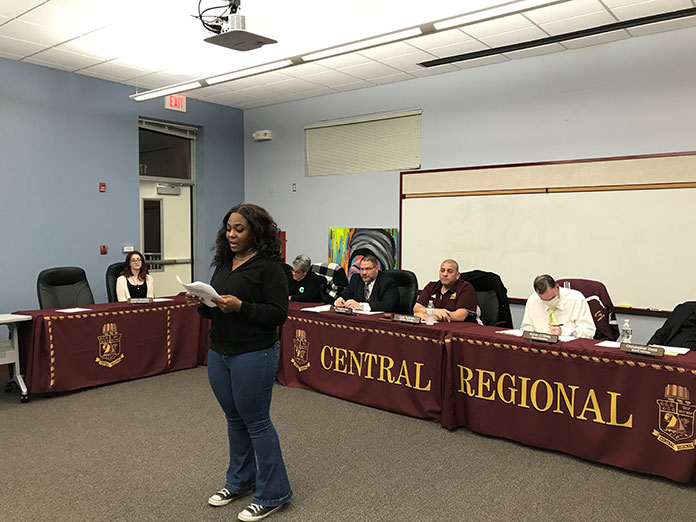
Officials vowed to take action to address this situation. The most recent meeting opened with the board instituting a social media policy which read, in part, that a school board member must avoid conduct on social media that would violate the School Ethics Act.
“While this policy respects the right of Board members to use social networks, board members shall recognize that they are held to a higher standard than the general public with regard to standards of conduct and ethics,” the policy stated. “Board members should exercise care in setting appropriate boundaries between their personal and public online behavior, understanding what is private in the digital world often has the possibility of becoming public, even without their knowledge or consent.”
Specifically, the policy laid out that board members:
- Shouldn’t post anything that would violate district policies
- Respect all people
- Refrain from defaming the board, district, employees, students, or families
- Should not disclose confidential information
- Should not use their title to solicit a business where there’s a conflict of interest
- Should refrain from communicating with other board members online
- Should not respond to any posting or question as a board member
Penalties for breaking this policy include sanctions.
The meeting was standing room only, and the public demanded more accountability than this policy. Several of the speakers were students.
The first speaker of the meeting was junior Parker Miller. “Microaggressions, macro aggressions, vile and racist rants from students, teachers who refers to a race of people as “the blacks,” assistant principal who referenced to me…a honor student with a 4.0 GPA, key club member, community volunteer, student varsity athlete, and a former vice president of the student body as ‘well spoken’ and racist posts from school board members and that’s been my walk just this week. And there are hundreds of more kids who can empathize with this same experience here at Central Regional High School.
“Tonight I am not standing in front of you all asking for appeasement or atonement. I along with other countless peers are looking for change and action now,” she said.
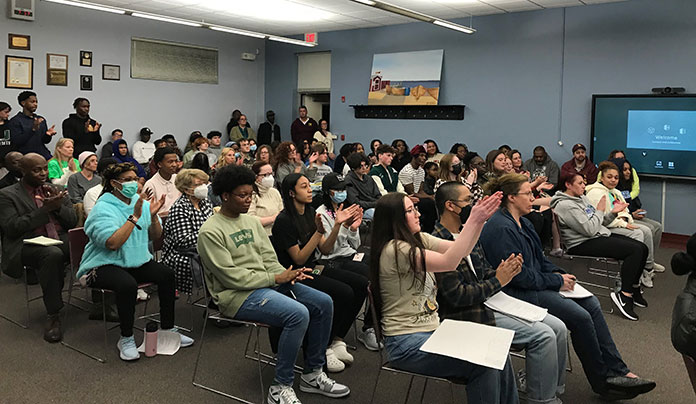
She suggested a number of changes, including a People Of Color Student Union Club; a diversity and inclusion advisory board (made up of parents, students, and community members); for administration to create an environment that supports students reporting incidents of harassment and intimidation; a 2022 recruitment plan for black teachers; complaints against the board member with the NJ School Ethics Commission; and a formal apology from the board and the board member in particular.
Her mother, Joeshun Miller, said that the climate in this country has been this way for years. Schools should be a safe harbor for children, and they should be able to come to staff if they have a problem. But staff at the high school have not handled it appropriately.
“When kids come forward, they feel ignored, or they feel like they’re being punished if they come forward,” she said.
Ebony Rivera is a parent but also the principal of the Ella G. Clarke school in Lakewood.
“There definitely needs to be diversity training for staff,” she said, describing a time a teacher spoke to her son privately and used a metaphor saying it was like he had a noose around his neck.
“The comments were grossly inappropriate,” Superintendent Triantafillos Parlapanides said of the social media postings. “Please don’t judge us by one or two people.”
One parent took that comment and provided the mirror of it, saying that racists think everyone of the same race is the same. “You say don’t let two board members reflect the rest of you, yet you saw two board members see something on TV that reflect all of us.”
Agnes Whitfield is a teacher and a coach at Central.
“I know racism first hand, I’m from Jackson,” she said. “My family was burned out by white supremacists.”
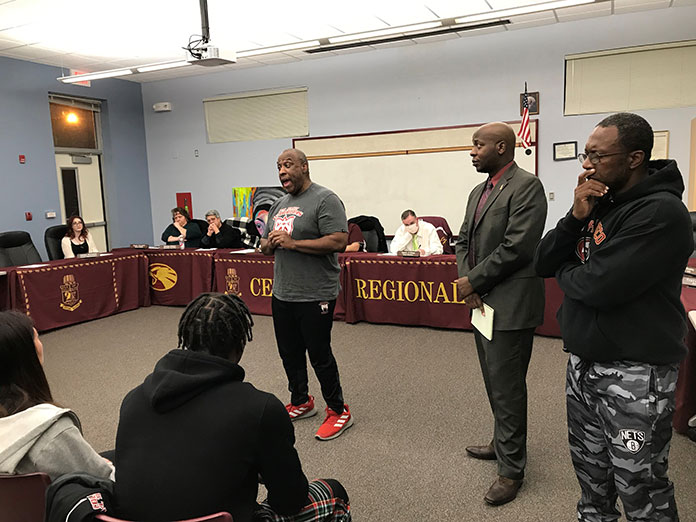
Crosses were burned on their lawn and there was a message “N….. get out of Jackson.”
Earlier that day, Central officials met with community leaders such as teacher Will Jacobs, Pastor Donnie Clyburn and Robert Taylor, who runs programs in Manitou Park. Taylor remembers when there were riots at Central between races when he attended.
“Dr. P. and Dr. Corbett listened,” Taylor said. “We have to give them a chance” to make it better, he told the crowd. If they don’t, then the public needs to keep on them. But they have to be given time to work it out.
A lot of members of the public wanted to be in on that meeting of community leaders. Taylor said the group started small, to build a foundation. Eventually, there will be more members. More voices will be brought to the table.
The Board of Education meeting became an impromptu version of that community meeting. Parents and students came up and told stories of horrible things that they witnessed.
They shared stories like how Black students are frequently asked if they can give an N card. This means that the Black person gives the white person the OK to use the N word. The Black students feel like they have to say yes because if they rock the boat there will be consequences.
Teachers and coaches hear the slurs but choose to dismiss it, they said. There’s an Instagram page called “N…..s at Central Regional” where kids are encouraged to post pictures of Black students.
When their friends say something racist, they have to let it go, they said. They have to make a choice at that moment whether to make it an issue or not. And they said they didn’t feel comfortable talking to staff about it. They didn’t think their concerns were being heard by staff. They feared retaliation from students.
Board member Lisa Cowdrick said that the board meets with 40-45 kids at bimonthly meetings and these issues are never brought up. “I thought it was just two school board members who made bad choices,” but this is all new information to her. She also recalled being at Central in the 70s when the race riots were.
“We have more of a big problem than two of our board members,” she said.
At one point, Parker Miller was allowed to sit next to the board’s official student representative as a way to show she was being heard.
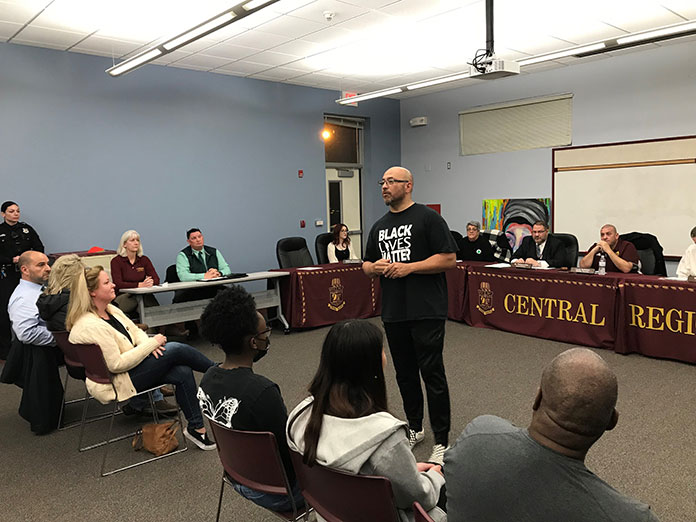
Another student, Jaivon Tate, later sat down next to a board member as well. He had said he almost fought some of the kids making racial remarks but if he did that, it would just be fueling their argument.
Several of the remarks centered on specific offenders.
Rivera, the principal in Lakewood, cautioned against labeling a student as a racist. “Leave room for him to change. He may have done racist things but don’t call him a racist. Let’s love the hell out of him.
“Those two Board of Education members are the scapegoats, but it’s the culture” that has to change, said Rivera. The culture will be there whether those board members are here or not.
“They’re not here,” Pastor Clyburn said of the two board members, pointing to their empty seats. Then, referring to the rest of the board, “and they’re catching the brunt of it.”
If you want to make changes, you need to vote, he said. These two got on the board because of an election. Don’t say that elections don’t matter.
Several parents said that they have had to speak to their children about racism, and about how they are perceived by society. They have to do this because of the color of their skin. White parents might never have to talk to their children about race.
“We’re having the conversation with our kids, but someone needs to have that conversation with the offenders,” Joeshun Miller said.
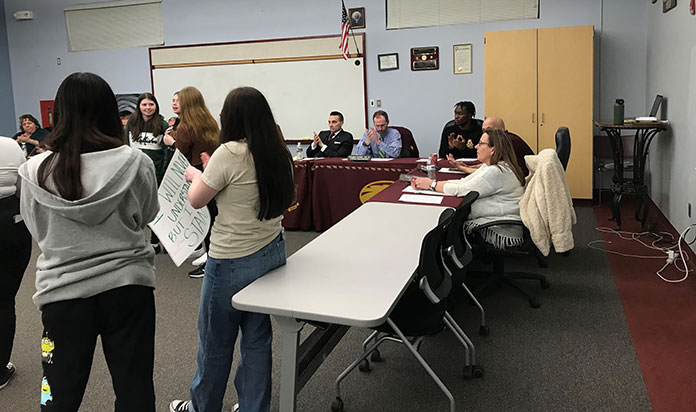
Residents urged the board to file ethics complaints against Koenig for her social media posts.
Board attorney Christopher Dasti said that the board can’t legally discipline or kick out its own members.
The residents responded, saying that individual board members should file complaints as citizens. A member of the public doled out forms to have people file complaints.
Not Just Black And White
An Asian student said she was scared to come to school during the beginning of COVID because the virus was being blamed on China. She said other students squint at her in the hallway or ask if she eats dogs and cats. Teachers turn a blind eye toward it.
A bilingual student said that students that don’t speak English don’t know where to go.
“They came here to do better, but without support they can’t get better,” she said.
Parlapanides said that the district used to have an English as a Second Language program, but when the number of kids who needed it went down, the program stopped.
Livera, the principal in Lakewood, asked how the school can not have an ESL program.
“I’m embarrassed,” Board member Cowdrick said. “I chair the education committee and I didn’t know we didn’t have ESL.”






